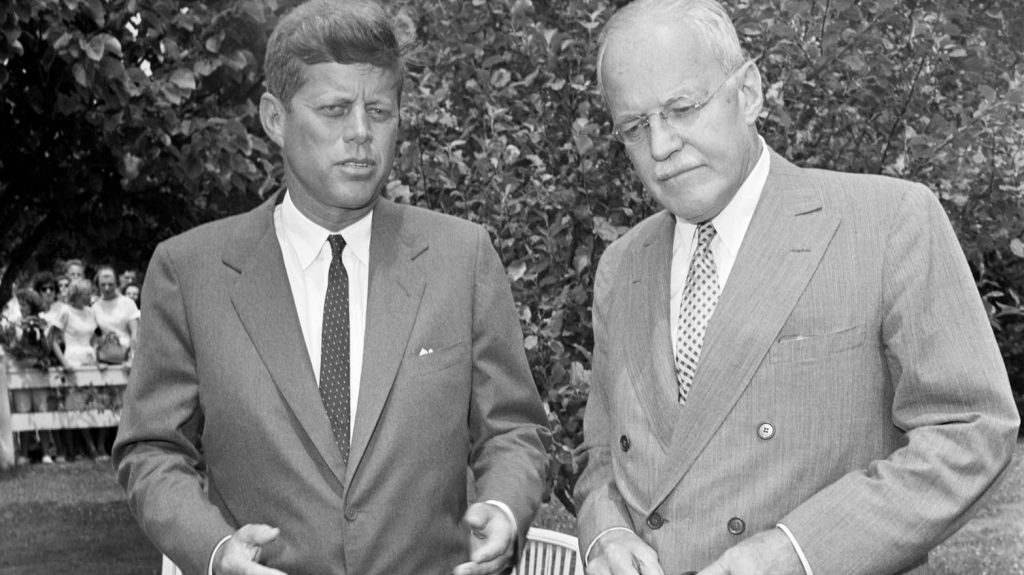
by Michael Ray FitzGerald
It appears it has become trendy to assert the CIA killed thirty-fifth president of the US, John Fitzgerald Kennedy. This is an old trope that’s been floating around since the 1963 assassination and has been resurrected by Robert F. Kennedy Jr. (JFK’s nephew) among others, including former Fox News host Tucker Carlson (whether Carlson’s on-air repetition of this moldy chestnut was the real reason for his recent dismissal is a matter of speculation).
“The CIA did it” is a specious trope in that is almost accurate but misses the point. It doesn’t go far enough, and it doesn’t name any names. What is more, the men who arguably planned and executed the assassination had been but were no longer CIA personnel when they did the dirty deed.
Amid the pile of red herrings and assorted distractions there are a few choice books that shine a light on who really orchestrated the hit—along with other related assassinations—and why. Perhaps the most important is JFK vs. Allen Dulles: Battleground Indonesia by Australian foreign-policy historian Greg Pulgrain, published in 2020.
There have been other books, such as David Talbot’s excellent Devil’s Chessboard (2015), that point to Dulles and his flunky E. Howard Hunt as the architects of the assassination. There are even some that describe Dulles’ glaring conflicts of interest: he was on the Rockefeller payroll in one form or another virtually the entire time he was in government, including a nine-year stint as director of central intelligence (DCI). Dulles had not only been the director of the largely Rockefeller-funded Council on Foreign Relations but was on extended leave from Wall Street law firm Sullivan and Cromwell—headed by his brother John Foster Dulles, who was married to a Rockefeller cousin—that for decades represented Rockefeller’s Standard Oil. He was a Rockefeller man through and through.
The main problem with this CIA-did-JFK trope is, as Talbot’s book indicates, neither Dulles nor Hunt was on the CIA payroll when Dulles commanded the operation from his home. Clearly the CIA itself did not do it. It was former CIA officials, acting on behalf of private business interests.
However, as Greg Poulgrain argues in JFK vs. Allen Dulles, Dulles had been DCI when he initiated neutralization programs of Republic of Congo President Patrice Lumumba—carried out just three days before Kennedy assumed office in 1961—and UN Secretary-General Dag Hammarskjold later that same year, both on behalf of US extraction interests, including Freeport Mining, a Rockefeller outfit.
We also know from other books, for example Gerard Colby’s Thy Will Be Done: The Conquest of the Amazon, Nelson Rockefeller and Evangelism in the Age of Oil (2017), that the Kennedy brothers and the Rockefellers had been having a blood feud, largely over the latter’s neocolonial practices, which JFK professed to abhor. He was apparently very concerned with the UN’s campaign to end overseas colonialism as well as winning over Third World (i.e., nonaligned) countries—and their UN votes—to the US sphere during the Cold War. Neither the Rockefeller brothers nor the Dulles brothers shared any such concerns.
A 2010 book, Russ Baker’s Family of Secrets: The Bush Dynasty, America’s Invisible Government, and the Hidden History of the Last Fifty Years includes this passage:
[JFK] antagonized American businessmen, including Nelson Rockefeller, when he interfered with their oil- and mineral-development plans in Brazil’s vast Amazon basin. “Those robbing bastards,” JFK told Walter Heller of the Council of Economic Advisors.… “I’m going to murder them!”
It is reasonable to presume that JFK’s private outburst got back to Nelson Rockefeller. Not to be upstaged, JFK’s brother, attorney general Robert F. Kennedy, completely gave away the game when he foolishly declared, “We Kennedys—we eat Rockefellers for breakfast.”
There are other books that point to Allen Dulles as the architect of the JFK assassination. But Greg Pulgrain’s JFK vs. Allen Dulles introduces a jarring twist: this historical study of foreign policy and diplomacy—or rather lack thereof—occasionally reads like compelling crime fiction.
Pulgrain points to what was likely the greatest treasure on Earth at that time—a massive gold mine in West Papua worth billions—that neither the UN’s Hammarskjold nor JFK knew existed. It was a jealously guarded secret: only a few people in the world knew of it including the Dutch colonial discoverers who found it in 1936, the Rockefellers themselves (of Freeport) and of course Allen Dulles.
Dulles’s task was to quietly wrest this bonanza from the Dutch and turn it over to the newly independent Indonesians, who didn’t know what they had and would happily contract with US concessionaires such as Freeport. This took literally decades of scheming and subterfuge. Once it was done, Indonesian president Sukarno, a persistent thorn in the US globalists’ side, had to be replaced in 1965 in one of the dirtiest coups in history and its horrifying aftermath, reminiscent of Operation Phoenix in Vietnam. Indonesia’s waterways became clogged with corpses.
Dulles—one the most skilled, patient and truly devious chess masters of all time—knew what his endgame was and what it was all about. JFK, Hammarskjold and Sukarno had no clue what was actually going on. If Dulles hadn’t been a murdering psychopath and a ruthless gangster, one might be tempted to admire the guy not only for his sheer brilliance but also for his dogged determination and intuitive grasp of how his opponents would react in the Cold War climate.
The one person who doesn’t get enough attention here is Nelson Aldrich Rockefeller. Although Pulgrain stops short of mentioning him by name, it’s clear in context that Rockefeller was the uncrowned king of the western world—if not the entire world—in addition to being Dulles’s personal liege lord.







